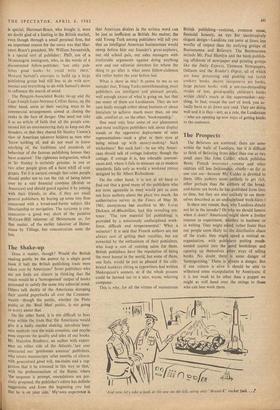The Shake-up
Does it matter, though? Would the British reading public be the poorer by a single good book if half the British publishing trade were taken over by Americans? Some publishers who are not fools are sincere in thinking that the result would be a 'homogenised' output of books processed to satisfy the same tiny editorial mind. Others talk darkly of the Americans dumping their unsold paperbacks all over the Common- wealth--though the public, whether the Plato public or the 'Real Men' public, is not going to worry about that.
On the other hand, it is not difficult to hear even within the trade that the Americans would give it a badly needed shaking, introduce busi- ness methods into the trade counters, and maybe even improve the quality and sales of our books. Mr, Malcolm Bradbury, an author with experi- ence on either side of• the Atlantic,' last year Contrasted our 'gentleman amateur' publishers, who return manuscripts 'after months of silence, with generalised good will, tea-stains and a sug- gestion that it be trimmed in this way or that,' with the professionalism of the States, where 'the response is prompt, emendations are pre- cisely proposed, the publisher's editor has definite suggestions and from the beginning you feel that he is on your side.' My-own experience is that American dealers in the written word can be just as inefficient as British. No matter; the odd Young Turk among publishers will tell you that an intelligent American businessman would sweep before him our founder's great-nephews, our old school pals, our sales managers with irrefutable arguments against doing anything new and our editorial directors for whom the thing to go after is what some fellow-clubman did rather better the year before last.
What is there in this? It seems to me as an outsider that, Young Turks notwithstanding, most publishers are intelligent and pleasant people, well enough aware of what is going on, but that too many of them are Laodiceans. They do not care badly enough either about business or about literature to achieve much more than, on one side, comfort or, on the other, 'bookmanship.'
One need only hear some of our pleasantest and most intelligent publishers talk about display stands or the aggressive deployment of sales representatives—such a glint in their eyes at being mixed up with money-making! Such wickedness! But such fun!—to see why Ameri- cans should talk of cottage industry; though the cottage, if cottage it is, has tolerable conveni- ences and, where it fails to measure up to modern standards, fails only as would a weekend retreat designed by Sir Albert Richardson.
On the other hand, it is not at all hard to find out that a good many of the publishers who are most agreeable to meet would just as soon not have authors about the place too much. An authoritative survey in the Times of May 30, 1961, anonymous but ascribed to Mr. Lovat Dickson of-Macmillan, had this revealing sen- tence: 'The raw material [of publishing] is provided by a notoriously undisciplined work- force, difficult and temperamental.' What a nuisance! It is said that French authors are not always sure of getting their royalties, but are rewarded by the enthusiasm of their publishers, who keep a sort of running salon for them. British publishers have the reputation of being the most honest in the world, but some of them, one feels, would be just as pleased if the cele- brated monkeys sitting at typewriters had written Shakespeare's sonnets, or if the whole process could be farmed out to a nice, warm, whirring computer.
This is why, for all the virtues of mainstream 'And now let's take 4 look at the one on the left, using only "Brund-X" rocket fuel... British publishing—restraint, common sense, financial honesty, an eye for unobtrusively elegant design—Laodicea can seem at times less worthy of respect than the outlying groups of Businessmen and Believers. The Businessmen include Mr. Paul Hamlyn and the book-publish- ing offshoots of newspaper and printing groups like the Daily Express, Thomson Newspapers, Odhams and the. Reader's Digest, all of which are busy processing and pushing out lavish cookery books, decent inexpensive art books, large picture books with a not-too-demanding rivulet of text, good-quality children's books within child's reach at the supermarket—any- thing, in fact, except the sort of book you ac- tually have to sit down and read. They are doing well and it is they—not, as a rule, the Laodiceans —who are opening up new ways of getting books to the customer.


































 Previous page
Previous page